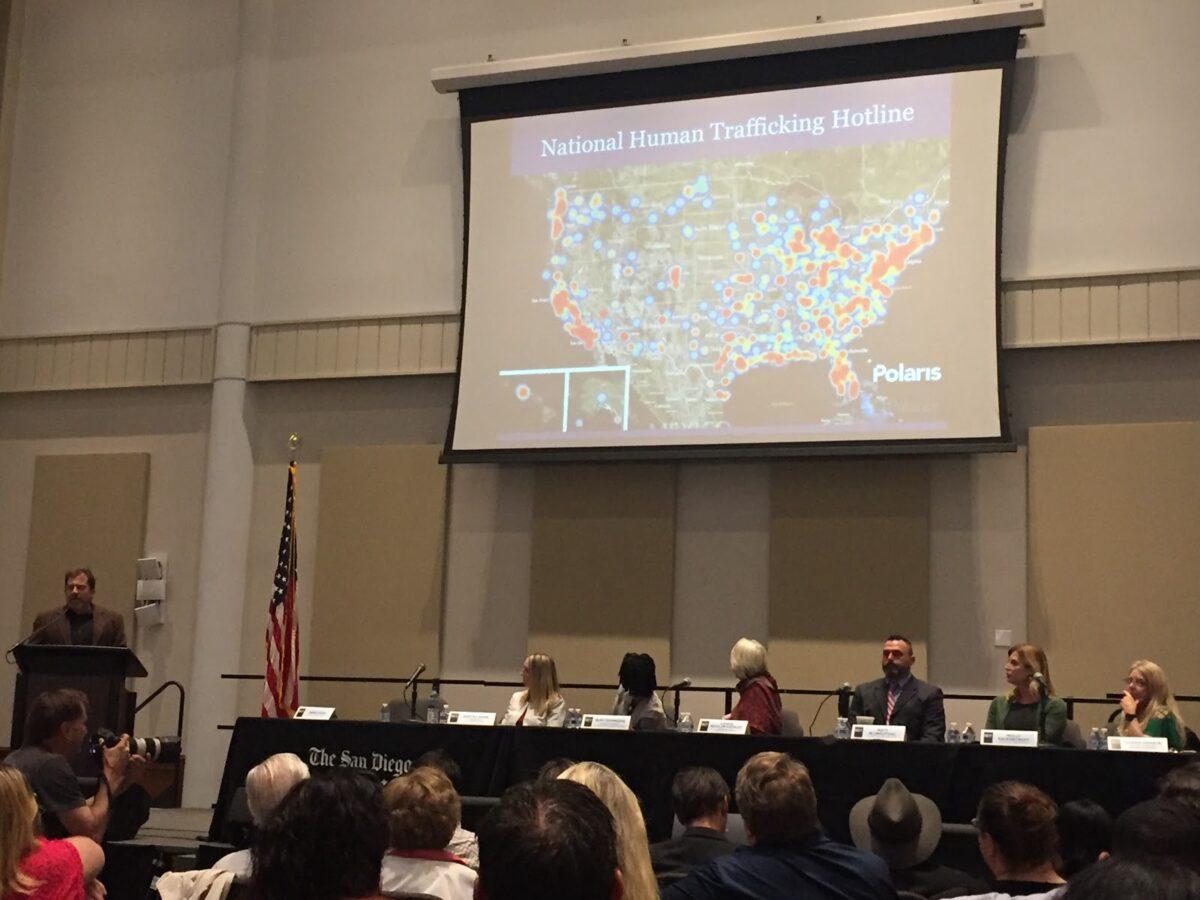Meet The San Diego DA Who Seized On The Human Trafficking Panic to Become A Law Enforcement Superstar
When veteran San Diego District Attorney Bonnie Dumanis announced her resignation during the spring of 2017 to run for a spot on the county’s Board of Supervisors, she was clear about who she wanted to finish her term and ultimately serve as San Diego’s next DA: her Chief Deputy Summer Stephan. Indeed, another former deputy […]

When veteran San Diego District Attorney Bonnie Dumanis announced her resignation during the spring of 2017 to run for a spot on the county’s Board of Supervisors, she was clear about who she wanted to finish her term and ultimately serve as San Diego’s next DA: her Chief Deputy Summer Stephan. Indeed, another former deputy district attorney said in an email obtained by the San Diego Union-Tribune that Dumanis envisioned a “smooth transition,” where Stephan would be gifted incumbency before having to face potential challengers in this June’s election.
In the years leading up to Dumanis’s resignation, Stephan — who was appointed interim DA in June 2017 — was a rising star at the office. Between 2005 and 2008, she was the chief of the San Diego DA’s Sex Crimes and Human Trafficking Division and in 2012 she was designated chief deputy DA. Since then, she has enjoyed support from local anti-trafficking groups and advocates, boosting her as an expert and leader, and formed alliances with national lobby groups like Demand Abolition. These groups are also united in pushing for tougher law enforcement action against trafficking — but with a focus on campaigning against sex work and cracking down on sex workers’ customers.
Stephan’s elevation as an anti-trafficking voice coincided with anti-trafficking groups’ efforts to put their issue in the spotlight. In October 2015 a headline-grabbing University of San Diego study declared that San Diego was home to up to 11,800 victims of human trafficking “per year” which appeared to vindicate Stephan’s trafficking focus. A joint press conference about the study featuring Stephan and the University of San Diego’s School of Peace Studies painted a devastating portrait of thousands of mostly young women whom gangs trafficked for sex. “I didn’t expect the number to be this high myself,” said Ami Carpenter, a co-author on the study, “But I’m fully confident in our methods.”
The study has since been used by anti-trafficking groups, such as the Alabaster Jar Project and even the Church of Scientology of San Diego, to make broad, authoritative claims about trafficking in San Diego County. But by April 2016, the Department of Justice had pushed the researchers to revise it significantly; the number of trafficking victims was pared down from an estimated range of 8,830 to 11,773 victims to an estimated range of 3,417 to 8,108 victims. But even the revised-down figure presents its own problems, said Dr. Anthony Marcus, chair of the anthropology department at John Jay College of the City University of New York, who has also conducted DOJ-funded research into trafficking. “Any time the range for a number is that wide — 3,417 to 8,108, much more than 100%,” Marcus told The Appeal, “it raises questions about how well the research can actually answer its own questions.” These limitations did not prevent groups that had coalesced around the issue of trafficking in San Diego to run with the study’s findings of a vast, hidden “industry” worth $810 million per year.

Like many of her peers in law enforcement who have focused on fighting trafficking with arrests and prosecutions meant to disrupt sex work, Stephan believes there’s no meaningful difference between sex work and trafficking. “Just from being on the ground doing this work for a long time, even those people that tell you they are choosing this life, they were recruited at an early age,” Stephan told the Voice of San Diego earlier this month. “So in my head, you know, how do you really become free if this is all you know when you don’t have [an] education or any other line of work to sustain yourself?”
This view, that women who sell sex are incapable of making their own choices, also extends to San Diego law enforcement’s view of women in the sex trade as trafficking victims. “Most victims will not identify as a victim until they encounter law enforcement between 7–10 times,” Matt Blumenthal, a sergeant with the San Diego County Sheriff’s Department and a supervisor at the San Diego Human Trafficking Task Force (HTTF), wrote in a blog post for the anti-trafficking nonprofit Thorn. Until a “victim” accepted law enforcement intervention, Blumenthal continued, they would also be uncooperative with prosecutors.
These prosecutors include Summer Stephan’s office, also a member of the HTTF, whose investigations of suspected trafficking often result in crackdowns on sex work. In June 2016, Stephan touted an operation targeting an online message board featuring advertisements for sex work as a major success in combating trafficking. Yet no trafficking charges were filed. Similarly, the HTTF runs annual prostitution stings dubbed Operation Reclaim and Rebuild that Stephan described as a “wake up call for men who buy sex,” after a March 2018 sting resulted in 29 arrests of men allegedly attempting to buy sex. Stephan’s office said this operation targeted “the demand side of sex trafficking.”
This “end demand” approach, supported by Stephan and groups in San Diego funded by Demand Abolition, is based on the belief that preventing men from buying sex in the first place is necessary in order to end human trafficking. This is why Stephan supported a program called the Cyber Patrol, first created by a Portland-area pastor that recruited volunteers — including current and former police officers — to create fake sex work ads, then inform the men who called for their services that sex workers are mostly trafficking victims. “Cyber Patrol, they are disrupting the demand,” Stephan toldthe San Diego Union-Tribune, “but actually at its core it’s providing accurate information about the damage and the harm that buying does.”
As for actual human trafficking, a category that also includes labor trafficking, prosecutions at Stephan’s office are down to 19 in total for the fiscal year ending in September 2017 from a high of 32 in 2013. As Cyber Patrol and Operation Reclaim and Rebuild demonstrate, what Stephan’s office has focused on instead is targeting men who attempt to buy sex, as well as lobbying for increased penalties for these men.
Stephan has touted her office’s support of new state laws that she says will help people who have been trafficked. The San Diego district attorney’s support of these laws is relatively new, however. In 2016, the office opposed SB 1322, which decriminalized prostitution for minors, joining with other prosecutors in the state, as well as SB 823, which would have vacated past criminal charges of those who were prosecuted while they were being trafficked. But since SB 823 went into effect, the San Diego public defender’s office and Free to Thrive, a local nonprofit that provides legal services to trafficking survivors, told The Appeal they have only been able to clear the records of six individuals.
In a recent interview with the San Diego Union-Tribune, Stephan acknowledged that her high-profile work on trafficking launched her into the top prosecutor spot once Dumanis announced her resignation. “Victims’ groups, a lot of the human trafficking work that I do, started to say, are you going to be the next DA,” she said. “We now are the gold standard for how you do sex crimes and human trafficking. I get called by other DA offices all the time to try to recreate it.” Prominent Stephan supporters, too, repeatedly tout her trafficking focus. On April 25, San Diego Convention Center Chair Gil Cabrera tweeted that Stephan “has lead [sic] the field” in trafficking.
But in the June 5 election, Stephan faces insurgent candidate Geneviéve Jones-Wright, a longtime public defender who is challenging Stephan’s record on trafficking, requesting cash bail for low-level offenses, advocating for rollbacks of recent criminal justice reforms, and highlighting Stephan’s failures in sexual assault cases. “My opponent’s failed leadership as head of the Sex Crimes Unit created the backlog of thousands of untested rape kits in San Diego County,” Jones-Wright said in March.
In an interview with The Appeal, Jones-Wright was particularly critical of Stephan’s trafficking prosecutions. “I’ll just be very blunt here,” Jones-Wright said, “she’s able to harp on these things because this has been her brand.” Contrary to Stephan’s assertion that sex workers are victims of trafficking, Jones-Wright explained, “there is absolutely the reality of voluntary sex workers, and, to say anything other than that is to be misinformed. So a person who touts herself as a national expert, who sits on all of these commissions couldn’t be more wrong in the field of her expertise. That is dangerous. It’s dangerous for combating human trafficking, it’s dangerous for protecting victims, it is dangerous for actually helping people who are engaged in sex work help law enforcement get the quote-unquote ‘bad guys’ who are abusing people.”
Jones-Wright also blasted Stephan for supporting a new federal law that would make online platforms liable for prostitution-related content, meant to shut down classified ads site Backpage.com but in reality making any website a target. The law’s proponents said it will combat trafficking — Stephan hailed it as ushering in an era when men will no longer “feel the anonymity of just going online and ordering a person like you’re ordering pizza” — but it has already resultedin the closure of websites sex workers rely on for income and safety. Jones-Wright believes that the legislation will make it more difficult to “to actually investigate and know who these people [traffickers] are … I would prefer for them to be on Backpage and Craigslist because we need to know who they are, if they are selling our children.”
Stephan’s representatives did not respond to repeated requests for comment from The Appeal.
Promising tough action against trafficking has helped Stephan garner an image as a progressive leader, even as the “reforms” she supports perpetuate the carceral status quo of criminalizing sex work, while possibly making it more difficult to help the actual victims of trafficking. Even Stephan seems to acknowledge her office’s limits in combating trafficking. “We know we can’t prosecute ourselves out of it,” she said in a 2017 story on San Diego’s “slow but steady progress” in the trafficking fight. Still, she added, “[i]t has to be a war that everyone engages in.”
